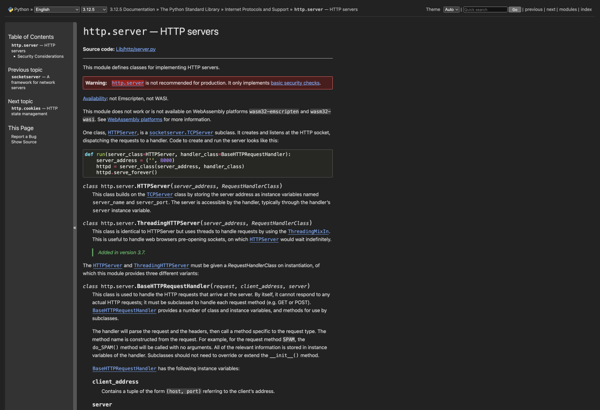SimpleHTTPServer

SimpleHTTPServer: Simple HTTP Server Module
SimpleHTTPServer, now known as http.server in Python 3, is a basic HTTP server module included in the Python standard library. It provides a simple way to serve static files from a directory, making it a convenient tool for quick file sharing or local development purposes.
What is SimpleHTTPServer?
SimpleHTTPServer is a module in Python 2, and in Python 3, it has been replaced by the http.server module. Both versions serve a similar purpose: providing a basic HTTP server that allows you to easily share and access files in a directory. Key Features: Static File Serving: The primary purpose of SimpleHTTPServer or http.server is to serve static files. It allows you to start a simple web server in any directory and make the files in that directory accessible via HTTP. Quick Setup: The server can be started with a single command, and it requires no additional configuration for basic usage. This makes it a handy tool for quick file sharing or testing web-related functionalities. Cross-Platform: As part of the Python standard library, SimpleHTTPServer and http.server are cross-platform, meaning they can be used on various operating systems without the need for additional installations. Default Port: By default, the server listens on port 8000, making it easy to access the files by navigating to http://localhost:8000 in a web browser. You can also specify a different port if needed. Integration with Python's http Module: In Python 3, the http.server module provides additional features compared to its Python 2 counterpart. It is part of the broader http module and includes classes like HTTPServer and SimpleHTTPRequestHandler for more advanced use cases. Usage (Python 3): ``` python3 -m http.server ``` Usage (Python 2): ``` python -m SimpleHTTPServer ``` While SimpleHTTPServer or http.server is not suitable for production use due to its simplicity and lack of advanced features, it serves as a convenient tool for quickly sharing files or testing simple web applications in a local development environment.
SimpleHTTPServer Features
Features
- Serves files from a local directory over HTTP
- Built-in to Python standard library
- Simple and easy to use
- Lightweight with minimal dependencies
- Good for basic static file hosting and local development
Pricing
- Open Source
- Free
Pros
Cons
Reviews & Ratings
Login to ReviewThe Best SimpleHTTPServer Alternatives
Top Development and Web Development and other similar apps like SimpleHTTPServer
Here are some alternatives to SimpleHTTPServer:
Suggest an alternative ❐Nginx

Apache HTTP Server

Lighttpd

LiteSpeed Web Server (LSWS)

Tornado Web Server

TinyWeb

Webfs

Osgood

Cherokee

Nanoweb

Mongrel

Mongrel2

Tntnet

WEBrick
